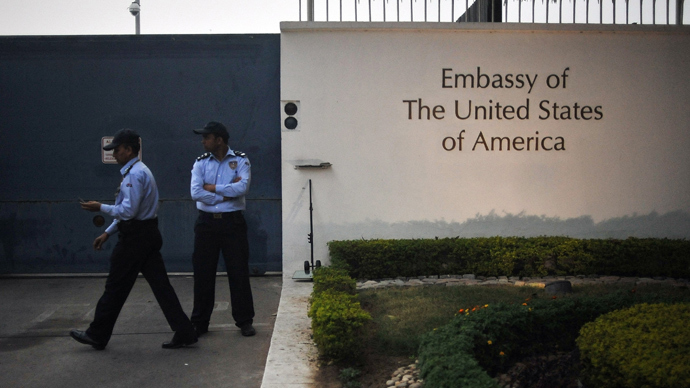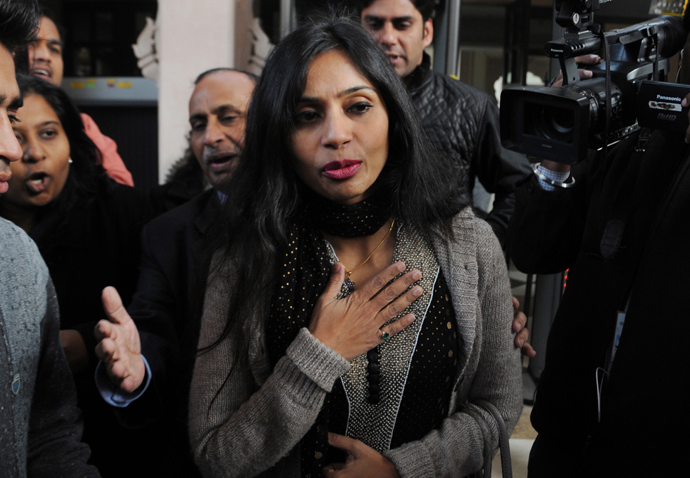Why can’t India, US see elephant in room of strained ties?

Indian-US relations have come full circle in just five years - from the peak of 2008 to the present low over the arrest of Indian diplomat Devyani Khobragade in New York on December 12.
In 2008, Indian Prime Minister Manmohan Singh staked his United Progressive Alliance (UPA) government on an Indo-US nuclear deal.
It is indeed ironic that while at the end of Singh’s first term, Indo-US bilateral relations were soaring. Now, as his second term is about to end, ties between New Delhi and Washington are on the rocks. The two sides’ principals – Singh and US President Barrack Obama – have done precious little to stem the rot.
For the first time in over 34 years, America has had to suffer the ignominy of having one of their diplomats expelled from India this January - a tit-for-tat action. The US is not used to facing this kind of diplomatic retaliation from South Asia. Russia and China are a different kettle of fish.
Worse, there is a groundswell of anti-Americanism in India cutting across the party lines. The Congress-led UPA government is in the middle of Phase Two of its tit-for-tat diplomacy and restoring complete diplomatic parity with the US by withdrawing non-reciprocal privileges and perks that have traditionally been enjoyed by American diplomats in India for decades.
The Indian government is not done yet. The American Embassy School (AES) in New Delhi has come under the radar for tax evasion estimated to be worth hundreds of thousands of dollars - maybe even millions of dollars.
At least 16 American diplomats in New Delhi have been found to have indulged in furnishing false information in their visa application forms – an illegal act for which they were prodded by their higher-ups. In other words, they are guilty of the same crime for which Devyani Khobragade was hauled over coals: visa fraud.
These findings were corroborated by none other than America’s own New York Times a few days ago, and Washington has not been able to deny the allegations. It remains to be seen what action the Indian government will take in this matter.
The AES controversy is a far bigger setback to the US than withdrawal of VIP facilities to American diplomats in India (which the Americans never extended to Indians in the US) or the removal of security barricades from the vicinity of US embassy in New Delhi. Till the AES skeletons tumbled out of the US closet, the security-obsessed Americans were rattled only by the removal of barricades.

The Indian government has shot down US objections in this regard, saying that ensuring the security of the American embassy and all its missions and diplomats was the responsibility of India and it was up to the Indian government as to how it discharges its responsibility. Later, though, India stepped up security at the US Embassy and other American institutions in Delhi, deploying as many as 150 police personnel.
Theoretically, if India were to go by the rule book and play the reciprocity principle to the hilt (like the State Department did in case of Devyani Khobragade), the US may face the specter of as many as 16 officials deported for violating Indian laws.
As for now, the Indian government seems bent upon taking the already started actions vis-a-vis the American diplomats to their logical conclusion. And the next logical step may well be slapping the Income Tax Department’s demand notices on the AES.
The Indian government is aware of the fact that the AES has been indulging in these illegal activities since 1972. By that count, the total liability of the AES in terms of tax arrears along with penalties may run into millions of dollars.
All governments since 1972 have been aware of the AES’s activities, but chose not to initiate any action for whatever reason – perhaps because no government in New Delhi wanted to ruffle the American feathers, or perhaps because this was not on their priority to-do list.
The immediate fallout of the Devyani Khobragade episode has been the decisive and most comprehensive action unleashed by a wounded Indian government. These actions included asking the US embassy in New Delhi to give complete information about the salaries being paid to American diplomats and their Indian staffers and the incomes of the American diplomats’ spouses.
Three weeks have gone by since the Indian deadline expired, but the Americans are yet to furnish the required information.
Another important aspect of Indo-US tensions is that the anti-Americanism in India is not limited just to the UPA government. The Left Front, a bloc of four parties, is a known US-baiter. The Indian Reds see red in anything and everything when it comes to Washington – be it a political issue like the Iran tangle or an economic issue like the WTO negotiations.

Moreover, the Indian left parties are quite chummy with China. It was the Indian left parties’ antipathy toward the US that made them withdraw support to the UPA 1 in 2008 over the Indo-US nuclear deal, though it is another matter that the UPA government survived the vote of no-confidence in parliament.
Even the main opposition party, the Bharatiya Janata Party (BJP) has no love lost for the US. It is an open secret that the BJP is on the ascendance and is widely tipped to win the forthcoming general elections, scheduled to take place within 100 days.
The BJP has a long running grouse with the Americans over the US refusing to issue a visa to their prominent leader and Gujarat Chief Minister Narendra Modi. The US has continued with this policy even after Modi was anointed as the BJP’s prime ministerial candidate a few months ago.
This puts Washington in a quandary. The question is: can the US continue with its ‘no business with Modi’ strategy if he becomes India’s prime minister?
What’s more, India displayed a united and bi-partisan approach regarding the US over the Devyani Khobragade case, with the BJP and the Congress firmly attacking the American attitude to the matter. As recently as January 18, 2014, BJP President Rajnath Singh went on record as telling the party’s National Council in New Delhi that relations with the US have hit a low not seen even after the Pokhran-II nuclear tests in 1998 under the Atal Bihari Vajpayee regime.
"However much we condemn the undue harassment meted out to our diplomat [Devyani Khobragade] on American soil, it would not be enough. The US view of this incident is completely unreasonable and condemnable," Rajnath Singh said.
Interestingly, a couple of weeks ago the US had objected to the venue of Modi’s rally in Mumbai citing security concerns as the rally venue was very close to the US consulate building. The UPA government had dismissed the US objection saying that it was none of the US business where and how Indian political parties hold their rallies and reminded the Americans that ensuring their security was India’s concern alone.
This kind of bipartisan closing of ranks between the ruling party and the main opposition party vis-a-vis the US is rare. Incidentally, the BJP withdrew its invitations to the American diplomats for Modi’s rally – again a rare snub for the US.
The million-dollar question is: why can’t the top leadership of the US and India see the growing anti-Americanism in India and stem the rot? This is the elephant in the room.
Rajeev Sharma for RT
The writer is a New Delhi-based strategic analyst who tweets@Kishkindha
The statements, views and opinions expressed in this column are solely those of the author and do not necessarily represent those of RT.













